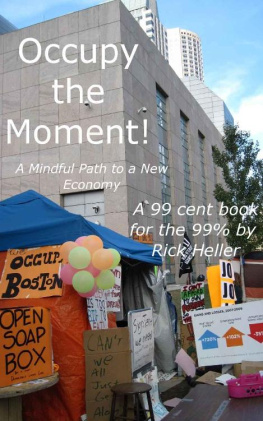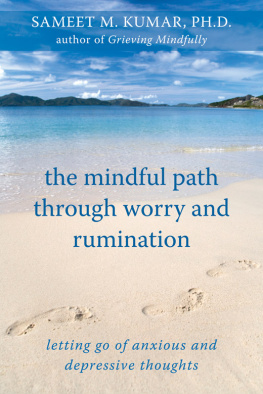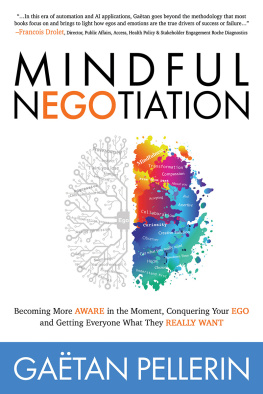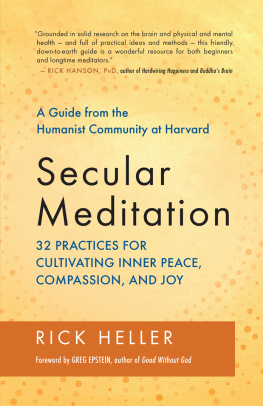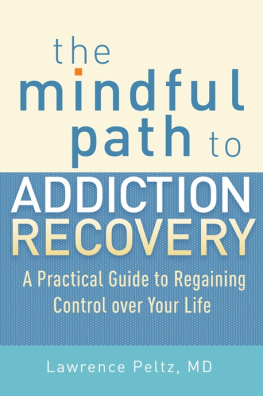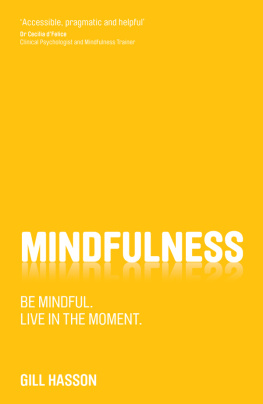Occupy the Moment:
A Mindful Path to a New Economy
By Rick Heller
The first $5,000 in royalties from this edition
and 50% thereafter
will be donated to the Occupy movement
(subject to the conditions outlined in the text below)
Table of Contents
Introduction
The Occupy Wall Street protests have struck a chord heard far beyond the sometimes unruly activists who initiated it. The global economic system is currently in crisis. Major, perhaps radical changes are needed. Systemic problems make the United States a more unequal, unhealthy and unhappy place than it ought to be. Unfortunately, political solutions are likely to be elusive, given the archaic rules in Congress that allow a minority funded by an economic elite to block change.
Sometimes its quicker to change minds than to change institutions. The focus here is on personal and cultural change, of significant enough magnitude to serve as the foundation for political change in the coming years. Despite the election of President Barack Obama, we still live in the shadow of Ronald Reagan, whose veneration of the wealthy still permeates our culture. Reagan-era values must be undermined and replaced if we are to progress toward a society that meets the needs of all while ensuring that the Earths climate remains hospitable for future generations.
The problem the Occupy movement confronts is the greed of the wealthiest 1%. But greed is an aspect of the human condition. Few of us can be sure if we found ourselves elevated into the 1% that we would act differently. In fact, back in 2007, according to the highly-regarded CIRP Freshman Survey, three-quarters of those entering college said that being very well off financially was a very important personal goal. At least part of the anger of the Occupy movement is driven by young people who were enticed with visions of wealth, went deeply into debt in order to achieve it, and have now graduated into a job market that has shattered their illusions.
The fall 2011 Occupy Boston encampment hosted a 9-foot tall statue of the Indian independence leader Mahatma Gandhi. The figure, on loan from the Peace Abbey in Sherborn, Mass., supported a sign with the words, The world holds enough for everyones NEED, but not enough for everyones GREED.
In order to effectively confront the greed of the 1%, we must confront our own greed . For, otherwise, why should they listen to us? Im not suggesting we retreat from protesting misrule by the economic elite that dominates our political system. But we need a two-pronged strategy of promoting political change and cultural change.
The Buddha, in the Four Noble Truths, identified grasping desire as the key source of suffering. As a solution, he proposed an Eightfold path of thought and action. Among the eight elements is mindfulness, the practice of paying attention to the present moment with a friendly, accepting attitude.
We held mindfulness meditations at Occupy Boston. In a meditation at the Sacred Space tent, we focused on the sounds present around us. When paying attention mindfully, even the sounds of trucks and sirens can bring joy. One afternoon, Buddhist monks and nuns from Plum Village in France led us on a mindful walking meditation from Occupy Boston to Copley Square more than a mile away.
Paying loving attention to the slightest things in the present environment can make us happy. This can be a cure for greed. If millionaires were mindful, they would not cling to their wealth so tightly. Instead, they would intuitively understand that sharing a large portion of their wealth through either philanthropy or taxation could meet basic needs of the 99% without any real loss in happiness to themselves.
We in the 99% can serve as role models for those in the 1% who seek liberation from greed. To do this, we must be mindful of our own desires and ask whether we truly need certain things, or if we ought to share them with others who have even less than we do. In this way, compassion may trickle up to the 1% and liberate us all from greed.
In many ways, mindfulness is an individual pursuit. It may not be easy to see how it relates to economics. But in fact, our current economic system suffers from a lack of mindfulness. What spurs the economy is how we feel about money, and mindfulness can transform that.
We all must have basic physical needs met. We need food, shelter, clothing, and health care. Beyond that, most of what we call needs are psychological. We may not need as much money as we think in order to be happy. In fact, once a family's income exceeds $75,000, further income makes no difference in that family's emotional well-being. This finding, by psychologist Daniel Kahneman, a Nobel laureate in economics, raises the question: Why do the wealthiest 1% pursue wealth far beyond their ability to enjoy it, and resist sharing their good fortune with the other 99%?
Buddhism speaks of the Three Poisons: Greed, Hatred and Delusion. The focus here is on Greed. Why are rich people in the United States so greedy? Not all are, of course, but as a group, the wealthy have acted, especially over the last 30 years, to ensure they share less and less of their growing wealth with other people.
I dont consider myself to be a Buddhist. Rather, Im a secular individual who sees the Buddha as more of a philosopher like Socrates rather than the founder of a religion. I do accept the label secular Buddhist . Whatever I will present here is to the best of my ability consistent with mainstream academic science. It turns out that many Buddhist ideas line up very well with what neuroscientists are learning about the brain.
What drives greed, from the perspectives of both Buddhism and science, is the fleeting nature of the satisfaction that material possessions provide. You get something, but you become bored with it, and you look for the new, new thing. This leads to a cycle of addictive spending that psychologists call the consumption treadmill .
Consumerism can become an addiction. As with other addictions, when we become habituated to something, we need more and more of that substance in order to feel satisfied. To call consumerism an addiction is not just a metaphoraddictions are disorders of the brain system that governs our desires and habits. The financial indebtedness of the United States, both public and private, despite our being one of the richest countries on Earth is evidence that we truly are an addicted nation.
Mindfulness counteracts greed because it helps us feel satisfied with what we already haveonce basic needs like food and shelter are met. Mindfulness can make the negative feel neutral and the neutral a blessing. It increases the sense of freshness and novelty in daily life. It makes the ordinary awesome.
You may think that paying attention is hard. Teachers in school yell at you, Pay attention! But paying attention is something that can be cultivated. When you know how to do it right, it's not boringits literally wonderful. Once you start to practice mindfulness, this becomes self-evident. But if youre reluctant to try it because it sounds like hippie-dippy B.S., take a look at Appendix D. There I discuss nitty-gritty details of how mindfulness is implemented in the brain.
Mindfulness is not just paying attention to the present moment, but also bringing to it an attitude of acceptance, nonjudgment or equanimity. This should not be mistaken for apathy, however. Rather, the attitude can be one of friendliness or love for what is happening right now and for the people with whom you are sharing this moment, even under challenging circumstances.
Perhaps you feel that you cant possibly do this, that it doesnt come naturally to you. It didnt come naturally to me, and Im still working on it. The point is that like playing a musical instrument, feeling non-romantic love is a skill that you have to practice for it to become second nature . Now if this is sounding even more like some 1960s-era call to love one another, actually it is. But Im hard-edged enough to think that perhaps greed and hatred come naturally, but love has to be taught.

